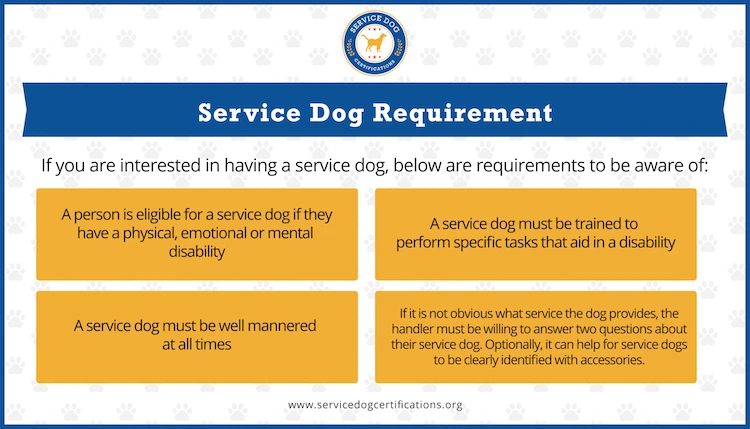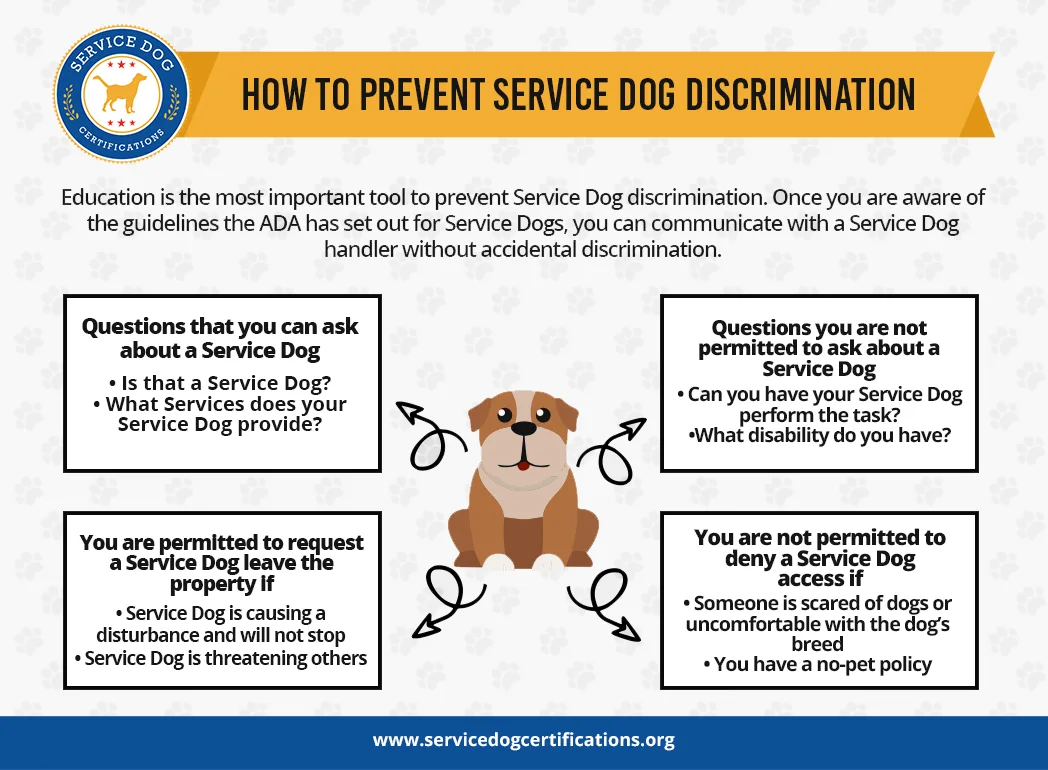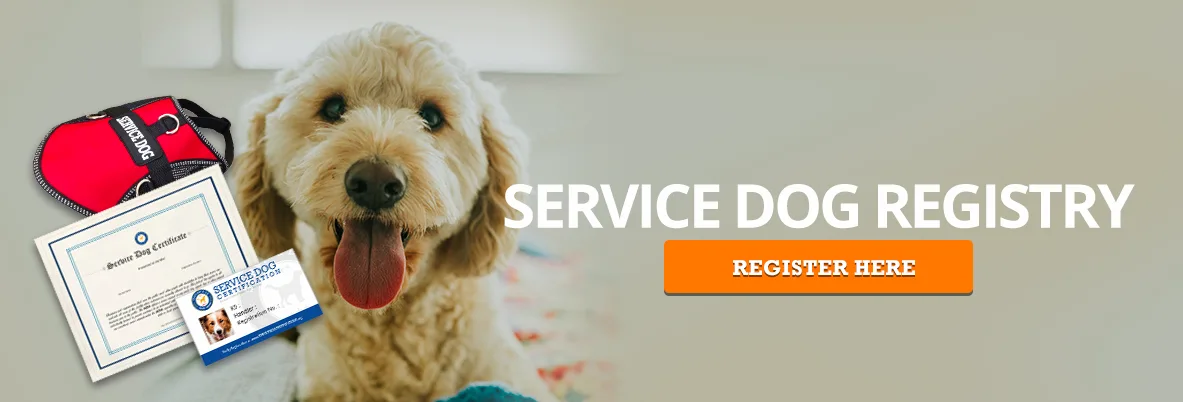Home Page › Blog › How to Register Your Dog as a Service Dog in Washington
How to Register Your Dog as a Service Dog in Washington

A purpose-trained service dog can provide invaluable assistance to disabled individuals, helping them enjoy more independent lives, move about with greater freedom and confidence, and provide valuable assistance in the event of a seizure or dangerously low blood sugar.
Many tasks that full-abled people take for granted, even something as simple as crossing the street or picking up an item they dropped, can be difficult, if not impossible, for some disabled individuals. Opening a door, pressing elevator buttons, or navigating through a crowded room can be performed by specially trained service dogs.
Service dogs aren’t pets, at least not in the way that many people think of owning an animal. They are working dogs, purposefully trained to complete specific tasks for their owner, and they pay attention to verbal and non-verbal cues indicating their owner needs assistance.
The primary function of a service dog is to help a disabled person live a life with more independence and to give a warning if a health emergency is imminent.
ServiceDogCertifications.com
Because of their tasks, service dogs are covered by the Americans With Disabilities Act (ADA) and afforded more access than other animals. They may go where a pet cannot, including in the cabin of an airplane, in a restaurant, to work, and to the doctor’s office.
Owners of service dogs have federally guaranteed rights. It’s important for these individuals to understand their protections under the ADA and if and how to qualify for one.

Defining Disability Under the Americans with Disabilities Act
The ADA defines a disabled person as one “who has a physical or mental impairment that substantially limits one or more major life activities.“ Prior to the enactment of the ADA, disabled individuals faced greater discrimination and were denied access to places and opportunities that others were granted, either overtly or by design, such as a lack of physical access for someone in a wheelchair.
Common discrimination included:
- Refusal of service at a restaurant or lack of accommodation
- Refusal of employers to hire individuals with disabilities
- Lower pay for disabled employees than for others working the same job
- Refusal to sell goods in a store to those with disabilities
Many people requiring wheelchairs were unable to ride public transportation because the wheelchairs couldn’t fit on the vehicles, limiting their access to leave home or go places in their city, including work. Without ADA protections, employers were perfectly within their rights to not hire someone with a disability, and business owners could refuse service to someone who was disabled.
The ADA specifically guaranteed protection for people with disabilities from this discrimination. Furthermore, ADA laws require many employers and business owners to make reasonable accommodations to allow disabled people access, including being able to shop, do a job, or lease a house or apartment.
Service Dogs as Defined by the ADA
The ADA defines a service dog as “any dog that is individually trained to do work or perform tasks for the benefit of an individual with a disability.” Disabilities, as per the ADA, aren’t just physical. It also stipulates protections for people whose disabilities may be sensory, intellectual or mental, and psychiatric.
The only animals that the ADA legally protects are service dogs. The ADA explicitly states that other species of animals, even trained domestic ones, do not meet the legal definition of a service animal.
Service dogs undergo rigorous training and are selected for their intelligence, trainability, and temperament. Not every dog is trained to perform the same tasks; a blind individual will have a differently trained service animal than someone who has epilepsy or uses a wheelchair.
Trained service dogs may provide these tasks:
- Guiding visually impaired or blind people
- Alerting deaf people to danger or other sounds
- Providing non-violent protection for the owner
- Pulling a person in a wheelchair and retrieving dropped items
- Detecting the presence of allergens and alerting an owner with severe allergies
- Providing support and stability for people with mobility or stability challenges
- Clearing a room for someone with PTSD and calming them during a panic attack
Service dogs perform tasks their owners cannot do themselves and offer protection that the owner may not receive in any other manner.

Registering a Service Dog in Washington State
Washington state does not require service dog registration nor requires owners to have specific dog tags identifying the service animal or carry service dog certification.
However, many people with a service dog find it easier to have service dog paraphernalia such as ID cards, vests, tags, and certificates to present to members of the public. To verify a service dog, a business owner or potential employer is allowed to ask what tasks the animal is trained to do.
So if you or someone you provide care for would benefit from a registered service dog, here are some steps to qualify for a service dog in Washington:
- Work with your doctor to determine the need you have for a service animal.
- Train the dog to provide the tasks you need to be completed, or work with a training organization to train a dog for you.
- After your dog is fully qualified as a service dog, you can consider accessories like ID cards, certificates, registrations, and vests.
Protections for Service Dogs Under Washington Law
Businesses and employers are required to make reasonable accommodations to allow disabled people and their service dog access that others have. And the dogs themselves are afforded protection – it’s illegal in Washington to interfere with the actions of a service dog when it is working.
Any reckless interference or injury to a service animal is either a misdemeanor or gross misdemeanor in Washington, depending on the charge. An individual guilty of intentionally causing the death of a service animal will be charged with a Class C felony.
Know Your Rights as a Service Dog Handler in Washington State
Your freedom and rights as a disabled person with a service animal are federally protected by the Americans With Disabilities Act. These civil rights cannot be taken away from you or restricted.
You do not have to present service dog registration; your word that it is a trained service dog is enough. When it is not evident that the dog is a service animal, staff may ask only two questions:
- Is the dog a service animal required because of a disability? and
- What work or task has the dog been trained to perform?
Your service animal is permitted to enter places where pets are not allowed, including your workplace, restaurants, and grocery stores.
While service dogs are not required to have formal registration or identifying tags, many owners find it easier to provide their service dog with a vest and accompanying documentation. Service Dog Certifications offers registrations and service dog paraphernalia for fully trained service dogs and responsible service dog owners.
About the Author: The writing team at Service Dog Certifications is made up of folks who really know their stuff when it comes to disability laws and assistance animals. Many of our writers and editors have service dogs themselves and share insights from their own experiences. All of us have a passion for disability rights and animals.
4 comments
Leave a Reply Cancel reply
Latest Posts

How to Bring a Service Dog to Disneyland
Trained service dogs are more than welcome to join their handlers at Disneyland. In this guide, we’ll explain Disneyland’s policies and give practical advice for bringing a service dog to Disneyland for the first time. Disneyland’s Service Dog Policies The Magic Kingdom is happy to welcome trained service dogs across most park locations! They kindly […]

Read More

Can Dogs Eat Tomatoes?
Yes! Dogs can safely enjoy tomatoes, but there are a few risks to be aware of so you can feed your dog responsibly. Fully ripe tomatoes (without the stems and leaves) can actually have nutrients that are good for your pup. Tomatoes have chlorogenic acid, an antioxidant that can have anti-inflammatory effects in cells. They’re […]

Read More

Can a Primary Care Doctor Write an ESA Letter?
Your family doctor, also called a primary care physician (PCP), can write a letter recommending an emotional support animal. We’ll explain what legally gives them that ability and explore what better options might be available for you. Why are Physicians Able to Write an ESA Letter? To turn your pet into an emotional support animal, […]

Read More









Extremely informative and helpful! Thank you so much for writing this about Washington!
Thank you! We’re glad you found the article helpful.
This is really helpful and I think I could get a better understanding of everything in general than you!!!
Thank you for the very nice words!